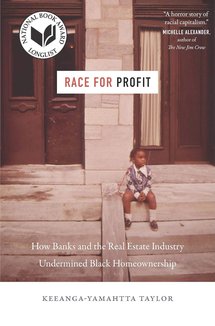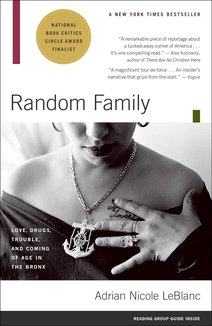Recommended Books

Race for Profit: How Banks and the Real Estate Industry Undermined Black Homeownership (Justice, Power, and Politics)
Author:
Keeanga-Yamahtta Taylor
ISBN 13:
978-1469653662
LONGLISTED FOR THE 2019 NATIONAL BOOK AWARD FINALIST, 2020 PULITZER PRIZE IN HISTORY By the late 1960s and early 1970s, reeling from a wave of urban uprisings, politicians finally worked to end the practice of redlining. Reasoning that the turbulence could be calmed by turning Black city-dwellers into homeowners, they passed the Housing and Urban Development Act of 1968, and set about establishing policies to induce mortgage lenders and the real estate industry to treat Black homebuyers equally. The disaster that ensued revealed that racist exclusion had not been eradicated, but rather transmuted into a new phenomenon of predatory inclusion . Race for Profit uncovers how exploitative real estate practices continued well after housing discrimination was banned. The same racist structures and individuals remained intact after redlining's end, and close relationships between regulators and the industry created incentives to ignore improprieties. Meanwhile, new policies meant to encourage low-income homeownership created new methods to exploit Black homeowners. The federal government guaranteed urban mortgages in an attempt to overcome resistance to lending to Black buyers – as if unprofitability, rather than racism, was the cause of housing segregation. Bankers, investors, and real estate agents took advantage of the perverse incentives, targeting the Black women most likely to fail to keep up their home payments and slip into foreclosure, multiplying their profits. As a result, by the end of the 1970s, the nation's first programs to encourage Black homeownership ended with tens of thousands of foreclosures in Black communities across the country. The push to uplift Black homeownership had descended into a goldmine for realtors and mortgage lenders, and a ready-made cudgel for the champions of deregulation to wield against government intervention of any kind. Narrating the story of a sea-change in housing policy and its dire impact on African Americans, Race for Profit reveals how the urban core was transformed into a new frontier of cynical extraction.

Random Family: Love, Drugs, Trouble, and Coming of Age in the Bronx
Author:
Adrian Nicole LeBlanc
ISBN 13:
978-0743254434
Selected as One of the Best Books of the 21st Century by The New York Times * “An insider’s narrative that grips from the start." — Vogue * “Unmatched in depth and power and grace. A profound, achingly beautiful work of narrative nonfiction.” —Matthew Desmond, author of Evicted * This New York Times bestseller is an "astonishingly intimate" ( New York magazine) and harrowing chronicle of drugs, poverty, and three generations of women in the South Bronx. In her extraordinary bestseller, Adrian Nicole LeBlanc immerses readers in the intricacies of the ghetto, revealing the true sagas lurking behind the headlines of gangsta glamour, gold-drenched drug dealers, and street-corner society. Focusing on two romances—Jessica’s dizzying infatuation with a hugely successful young heroin dealer, Boy George, and Coco’s first love with Jessica's little brother, Cesar— Random Family is the story of young people trying to outrun their destinies. Jessica and Boy George ride the wild adventure between riches and ruin, while Coco and Cesar stick closer to the street, all four caught in a precarious dance between survival and death. Friends get murdered; the DEA and FBI investigate Boy George; Cesar becomes a fugitive; Jessica and Coco endure homelessness, betrayal, the heartbreaking separation of prison, and, throughout it all, the insidious damage of poverty. Charting the tumultuous cycle of the generations—as girls become mothers, boys become criminals, and hope struggles against deprivation—LeBlanc slips behind the cold statistics and sensationalism and comes back with a haunting true story that is a "riveting portrait of the other America" ( People ).